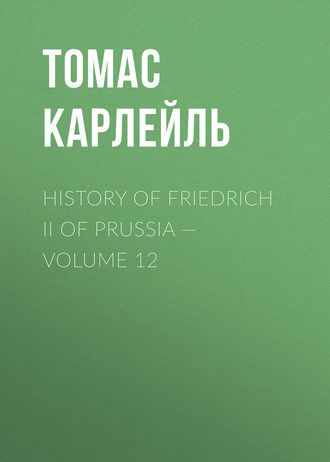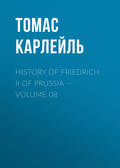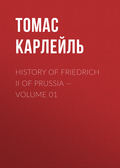
Томас Карлейль
History of Friedrich II of Prussia — Volume 12
DOWNBREAK OF PRAGMATIC SANCTION; MANNER OF THE CHIEF ARTISTS IN HANDLING THEIR COVENANTS
The operation once accomplished on its own Pragmatic Covenant, France found no difficulty with the others. Everybody was disposed to eat his Covenant, who could see advantage in so doing, after that admirable example. The difficulty of France and Belleisle rather was, to keep the hungry parties back: "Don't eat your Covenant TILL the proper time; patience, we say!" A most sad Miscellany of Royalties, coming all to the point, "Will you eat your Covenant, Will you keep it?"—and eating, nearly all; in fact, wholly all that needed to eat.
On the first Invasion of Silesia, Maria Theresa had indignantly complained in every Court; and pointing to Pragmatic Sanction, had demanded that such Law of Nature be complied with, according to covenant. What Maria Theresa got by this circuit of the Courts, everybody still knows. Except England, which was willing, and Holland, which was unwilling, all Courts had answered, more or less uneasily: "Law of Nature,—humph: yes!"—and, far from doing anything, not one of them would with certainty promise to do anything. From England alone and her little King (to whom Pragmatic Sanction is the Palladium of Human Freedoms and the Keystone of Nature) could she get the least help. The rest hung back; would not open heart or pocket; waited till they saw. They do now see; now that Belleisle has done his feat of Covenant-eating!—
Eleven great Powers, some count Thirteen, some Twelve, [Scholl, ii. 286; Adelung, LIST, ii. 127.]—but no two agree, and hardly one agrees with himself;—enough, the Powers of Europe, from Naples and Madrid to Russia and Sweden, have all signed it, let us say a Dozen or a Baker's-Dozen of them. And except our little English Paladin alone, whose interest and indeed salvation seemed to him to lie that way, and who needed no Pragmatic Covenant to guide him, nobody whatever distinguished himself by keeping it. Between December, 1740, when Maria Theresa set up her cries in all Courts, on to April, 1741, England, painfully dragging Holland with her, had alone of the Baker's-Dozen spoken word of disapproval; much less done act of hindrance. Two especially (France and Bavaria, not to mention Spain) had done the reverse, and disowned, and declared against, Pragmatic Sanction. And after the Battle of Mollwitz, when the "little stone" took its first leap, and set all thundering, then came, like the inrush of a fashion, throughout that high Miscellany or Baker's-Dozen, the general eating of Covenants (which was again quickened in August, for a reason we shall see): and before November of that Year, there was no Covenant left to eat. Of the Baker's-Dozen nobody remained but little George the Paladin, dragging Holland painfully along with him;—and Pragmatic Sanction had gone to water, like ice in a June day, and its beautiful crystalline qualities and prismatic colors were forever vanished from the world. Will the reader note a point or two, a personage or two, in this sordid process,—not for the process's sake, which is very sordid and smells badly, but for his own sake, to elucidate his own course a little in the intricacies now coming or come upon him and me?
1. ELECTOR OF BAVARIA.—Karl Albert of Baiern is by some counted as a Signer of the Pragmatic Sanction, and by others not; which occasions that discrepancy of sum-total in the Books. And he did once, in a sense, sign it, he and his Brother of Koln; but, before the late Kaiser's death, he had openly drawn back from it again; and counted himself a Non-signer. Signer or not, he, for his part, lost no moment (but rather the contrary) in openly protesting against it, and signifying that he never would acknowledge it. Of this the reader saw something, at the time of her Hungarian Majesty's Accession. Date and circumstances of it, which deserve remembering, are more precisely these: October 20th, 1740, Karl Albert's Ambassador, Perusa by name, wrote to Karl from Vienna, announcing that the Kaiser was just dead. From Munchen, on the 21st, Karl Albert, anticipating such an event, but not yet knowing it, orders Perusa, in CASE of the Kaiser's decease, which was considered probable at Munchen, to demand instant audience of the proper party (Kanzler Sinzendorf), and there openly lodge his Protest. Which Perusa did, punctually in all points,—no moment LOST, but rather the contrary, as we said! Let poor Karl Albert have what benefit there is in that fact. He was, of all the Anti-Pragmatic Covenant-Breakers (if he ever fairly were such), the only one that proceeded honorably, openly and at once, in the matter; and he was, of them all, by far the most unfortunate.
This is the poor gentleman whom Belleisle had settled on for being Kaiser. And Kaiser he became; to his frightful sorrow, as it proved: his crown like a crown of burning iron, or little better! There is little of him in the Books, nor does one desire much: a tall aquiline type of man; much the gentleman in aspect; and in reality, of decorous serious deportment, and the wish to be high and dignified. He had a kind of right, too, in the Anti-Pragmatic sense; and was come of Imperial kindred,—Kaiser Ludwig the Bavarian, and Kaiser Rupert of the Pfalz, called Rupert KLEMM, or Rupert Smith's-vice, if any reader now remember him, were both of his ancestors. He might fairly pretend to Kaisership and to Austrian ownership,—had he otherwise been equal to such enterprises. But, in all ambitions and attempts, howsoever grounded otherwise, there is this strict question on the threshold: "Are you of weight for the adventure; are not you far too light for it?" Ambitious persons often slur this question; and get squelched to pieces, by bringing the Twelve Labors of Hercules on Unherculean backs! Not every one is so lucky as our Friedrich in that particular,—whose back, though with difficulty, held out. Which poor Karl Albert's never had much likelihood to do. Few mortals in any age have offered such an example of the tragedies which Ambition has in store for her votaries; and what a matter Hope FULFILLED may be to the unreflecting Son of Adam.
We said, he had a kind of right to Austria, withal. He descended by the female line from Kaiser Ferdinand I. (as did Kur-Sachsen, though by a younger Daughter than Karl Albert's Ancestress); and he appealed to Kaiser Ferdinand's Settlement of the Succession, as a higher than any subsequent Pragmatic could be. Upon which there hangs an incident; still famous to German readers. Karl Albert, getting into Public Argument in this way, naturally instructed Perusa to demand sight of Kaiser Ferdinand's Last Will, the tenor of which was known by authentic Copy in Munchen, if not elsewhere among the kindred. After some delay, Perusa (4th November, 1740), summoning the other excellencies to witness, got sight of the Will: to his horror, there stood, in the cardinal passage, instead of "MUNNLICHE" (male descendants), "EHELICHE" (lawfully begotten descendants),—fatal to Karl Albert's claim! Nor could he PROVE that the Parchment had been scraped or altered, though he kept trying and examining for some days. He withdrew thereupon, by order, straightway from Vienna; testifying in dumb-show what he thought. "It is your Copy that is false," cried the Vienna people: "it has been foisted on you, with this wrong word in it; done by somebody (your friend, the Excellency Herr von Hartmann, shall we guess?), wishing to curry favor with ambitious foolish persons!" Such was the Austrian story. Perhaps in Munchen itself their Copyist was not known;—for aught I learn, the Copy was made long since, and the Copyist dead. Hartmann, named as Copyist by the Vienna people, made emphatic public answer: "Never did I copy it, or see it!" And there rose great argument, which is not yet quite ended, as to the question, "Original falsified, or Copy falsified?"—and the modern vote, I believe, rather clearly is, That the Austrian Officials had done it—in a case of necessity. [Adelung, ii. 150-154 (14th-20th November, 1740), gives the public facts, without commentary. Hormayr (Anemonen aus dem Tagebuch eines alten Pilgersmannes, Jena, 1845, i. 162-169,—our old Hormayr of the AUSTRIAN PLUTARCH, but now Anonymous, and in Opposition humor) considers the case nearly proved against Austria, and that Bartenstein and one Bessel, a pillar of the Church, were concerned in it.] Possible? "But you will lose your soul!" said the Parson once to a poor old Gentlewoman, English by Nation, who refused, in dying, to contradict some domestic fiction, to give up some domestic secret: "But you will lose your soul, Madam!"—"Tush, what signifies my poor silly soul compared with the honor of the family?"—
2. KING FRIEDRICH;—King Friedrich may be taken as the Anti-Pragmatic next in order of time. He too lost not a moment, and proceeded openly; no quirking to be charged upon him. His account of himself in this matter always was: "By the Treaty of Wusterhausen, 1726, unquestionably Prussia undertook to guarantee Pragmatic Sanction; the late Kaiser undertaking in return, by the same Treaty, to secure Berg and Julich to Prussia, and to have some progress made in it within six months from signing. And unquestionably also, the late Kaiser did thereupon, or even had already done, precisely the reverse; namely, secured, so far as in him was possible, Berg and Julich to Kur-Pfalz. Such Treaty, having in this way done suicide, is dead and become zero: and I am free, in respect of Pragmatic Sanction, to do whatever shall seem good to me. My wish was, and would still be, To maintain Pragmatic Sanction, and even to support it by 100,000 men, and secure the Election of the Grand-Duke to the Kaisership,—were my claims on Silesia once liquidated. But these have no concern with Pragmatic Sanction, for or against: these are good against whoever may fall Heir to the House of Austria, or to Silesia: and my intention is, that the strong hand, so long clenched upon my rights, shall open itself by this favorable opportunity, and give them out." That is Friedrich's case. And in truth the jury everywhere has to find,—so soon as instructed, which is a long process in some sections of it (in England, for example),—That Pragmatic Sanction has not, except helpless lamentations, "Alas that YOU should be here to insist upon your rights, and to open fists long closed!"—the least, word to say to Friedrich.
3. TERMAGANT OF SPAIN.—Perhaps the most distracted of the Anti-Pragmatic subterfuges was that used by Spain, when the She-dragon or Termagant saw good to eat her Covenant; which was at a very early stage. The Termagant's poor Husband is a Bourbon, not a Hapsburg at all: "But has not he fallen heir to the Spanish Hapsburgs; become all one as they, an ALTER-EGO of the Spanish Hapsburgs?" asks she. "And the Austrian Hapsburgs being out, do not the Spanish Hapsburgs come in? He, I say, this BOURBON-Hapsburg, he is the real Hapsburg, now that the Austrian Branch is gone; President he of the Golden Fleece [which a certain "Archduchess," Maria Theresa, had been meddling with]; Proprietor, he, of Austrian Italy, and of all or most things Austrian!"—and produces Documentary Covenants of Philip II. with his Austrian Cousins; "to which Philip," said the Termagant, "we Bourbons surely, if you consider it, are Heir and Alter-Ego!" Is not, this a curious case of testamentary right; human greed obliterating personal identity itself?
Belleisle had a great deal of difficulty, keeping the Termagant back till things were ripe. Her hope practically was, Baby Carlos being prosperous King of Naples this long while, to get the Milanese for another Baby she has,—Baby Philip, whom she once thought of making Pope;—and she is eager beyond measure to have a stroke at the Milanese. "Wait!" hoarsely whispers Belleisle to her; and she can scarcely wait. Maria Theresa's Note of Announcement "New Queen of Hungary, may it please you!" the French, as we saw, were very long in answering. The Termagant did not answer it at all; complained on the contrary, "What is this, Madam! Golden Fleece, you?"—and, early in March, informed mankind that she was Spanish Hapsburg, the genuine article; and sent off Excellency Montijos, a little man of great expense, to assist at the Election of a proper Kaiser, and be useful to Belleisle in the great things now ahead. [Spain's Golden-Fleece pretensions, 17th January, 1741 (Adelung, ii. 233, 234); "Publishes at Paris," in March (ib. 293); and on the 23d March accredits Montijos (ib. 293): Italian War, held back by Belleisle and the English Fleets, cannot get begun till October following.]
4. KING OF POLAND.—The most ticklish card in Belleisle's game, and probably the greatest fool of these Anti-Pragmatic Dozen, was Kur-Sachsen, King of Poland. He, like Karl Albert Kur-Baiern, derives from Kaiser Ferdinand, though by a YOUNGER Daughter, and has a like claim on the Austrian Succession; claim nullified, however, by that small circumstance itself, but which he would fain mend by one makeshift or another; and thinks always it must surely be good for something. This is August III., this King of Poland, as readers know; son of August the Strong: Papa made him change to the Catholic religion so called,—for the sake of getting Poland, which proves a very poor possession to him. Who knows what damage the poor creature may have got by that sad operation;—which all Saxony sighed to the heart on hearing of; for it was always hoped he had some real religion, and would deliver them from that Babylonish Captivity again! He married Kaiser Joseph I.'s Daughter,—Maria Theresa's Cousin, and by an Elder Brother;—this, too, ought surely to be something in the Anti-Pragmatic line? It is true, Kur-Baiern has to Wife another Daughter of Kaiser Joseph's; but she is the younger: "I am senior THERE, at least!" thinks the foolish man.
Too true, he had finally, in past years, to sign Pragmatic Sanction; no help for it, no hope without it, in that Polish-Election time. He will have to eat his Covenant, therefore, as the first step in Anti-Pragmatism; and he is extremely in doubt as to the How, sometimes as to the Whether. And shifts and whirls, accordingly, at a great rate, in these months and years; now on Maria Theresa's side, deluded by shadows from Vienna, and getting into Russian Partition-Treaties; anon tickled by Belleisle into the reverse posture; then again reversing. An idle, easy-tempered, yet greedy creature, who, what with religious apostasy in early manhood, what with flaccid ambitions since, and idle gapings after shadows, has lost helm in this world; and will make a very bad voyage for self and country.
His Palinurus and chief Counsellor, at present and afterwards, is a Count von Bruhl, once page to August the Strong; now risen to such height: Bruhl of the three hundred and sixty-five suits of clothes; whom it has grown wearisome even to laugh at. A cunning little wretch, they say, and of deft tongue; but surely among the unwisest of all the Sons of Adam in that day, and such a Palinurus as seldom steered before. Kur-Sachsen, being Reichs-Vicar in the Northern Parts,—(Kur-Baiern and Kur-Pfalz, as friends and good Wittelsbacher Cousins surely ought, in a crisis like this, have agreed to be JOINT-Vicars in the Southern Parts, and no longer quarrel upon it),—Kur-Sachsen has a good deal to do in the Election preludings, formalities and prearrangements; and is capable, as Kur-Pfalz and Cousin always are, of serving as chisel to Belleisle's mallet, in such points, which will plentifully turn up.
5. KING OF SARDINIA.—Reichs-Vicar in the Italian Parts is Charles Amadeus King of Sardinia (tough old Victor's Son, whom we have heard of): an office mostly honorary; suitable to the important individual who keeps the Door of the Alps. Charles Amadeus had signed the Pragmatic Sanction; but eats his Covenant, like the others, on example of France;—having, as he now bethinks himself, claims on the Milanese. There are two claimants on the Milanese, then; the Spanish Termagant, and he? Yes; and they will have their difficulties, their extensive tusslings in Italian War and otherwise, to make an adjustment of it; and will give Belleisle (at least the Doorkeeper will) an immensity of trouble, in years coming.
In this way do the Pragmatic people eat their own Covenant, one after the other, and are not ashamed;—till all have eaten, or as good as eaten; and, almost within year and day, Pragmatic Sanction is a vanished quantity; and poor Kaiser Karl's life-labor is not worth the sheepskin and stationery it cost him. History reports in sum, That "nobody kept the Pragmatic Sanction; that the few [strictly speaking, the one] who acted by it, would have done precisely the same, though there had never been such a Document in existence." To George II., it is, was and will be, the Keystone of Nature, the true Anti-French palladium of mankind; and he, dragging the unwilling Dutch after him, will do great things for it: but nobody else does anything at all. Might we hope to bid adieu to it, in this manner, and never to mention it again!—
Document more futile there had not been in Nature, nor will be. Friedrich had not yet fought at Mollwitz in assertion of his Silesian claim, when the poor Pope—poor soul, who had no Covenant to eat, but took pattern by others—claimed, in solemn Allocution, Parma and Piacenza for the Holy See. [Adelung, ii. 376 (5th April, 1741)] All the world is claiming. Of the Court of Wurtemberg and its Protestings, and "extensive Deduction" about nothing at all, we do not speak; [Ib. ii. 195, 403.] nor of Montmorency claiming Luxemburg, of which he is Titular "Duke;" nor of Monsignore di Guastalla claiming Mantua; nor of—In brief, the fences are now down; a broad French gap in those miles of elaborate paling, which are good only as firewood henceforth, and any ass may rush in and claim a bellyful. Great are the works of Belleisle!—
CONCERNING THE IMPERIAL ELECTION (Kaiserwahl) THAT IS TO BE: CANDIDATES FOR KAISERSHIP
At equal step with the ruining of Pragmatic Sanction goes on that spoiling of Grand-Duke Franz's Election to the Kaisership: these two operations run parallel; or rather, under different forms, they are one and the same operation. "To assist, as a Most Christian neighbor ought, in picking out the fit Kaiser," was Belleisle's ostensible mission; and indeed this does include virtually his whole errand. Till three months after Belleisle's appearance in the business, Grand-Duke Franz never doubted but he should be Kaiser; Friedrich's offers to, help him in it he had scorned, as the offer of a fifth wheel to his chariot, already rushing on with four. "Here is Kur-Bohmen, Austria's own vote," counts the Grand-Duke; "Kur-Sachsen, doing Prussian-Partition Treaties for us; Kur-Trier, our fat little Schonborn, Austrian to the bone; Kur-Mainz, important chairman, regulator of the Conclave; here are Four Electors for us: then also Kur-Pfalz, he surely, in return for the Berg-Julich service; finally, and liable to no question Kur-Hanover, little George of England with his endless guineas and resources, a little Jack-the-Giantkiller, greater than all Giants, Paladin of the Pragmatic and us: here are Six Electors of the Nine. Let Brandenburg and the Bavarian Couple, Kur-Baiern and Kur-Koln, do their pleasure!" This was Grand-Duke Franz's calculation.
By the time Belleisle had been three months in Germany, the Grand-Duke's notion had changed; and he began "applying to the Sea-Powers," "to Russia," and all round. In Belleisle's sixth month, the Grand-Duke, after such demolition of Pragmatic, and such disasters and contradictions as had been, saw his case to be desperate; though he still stuck to it, Austrian-like,—or rather, Austria for him stuck to it, the Grand-Duke being careless of such things;—and indeed, privately, never did give in, even AFTER the Election, as we shall have to note.
The Reich itself being mainly a Phantasm or Enchanted Wiggery, its "Kaiser-Choosing" (KAISERWAHL),—now getting under way at Frankfurt, with preliminary outskirts at Regensburg, and in the Chancery of Mainz—is very phantasmal, not to say ghastly; and forbidding, not inviting, to the human eye. Nine Kurfursts, Choosers of Teutschland's real Captain, in none of whom is there much thought for Teutschland or its interests,—and indeed in hardly more than One of whom (Prussian Friedrich, if readers will know it) is there the least thought that way; but, in general, much indifference to things divine or diabolic, and thought for one's own paltry profits and losses only! So it has long been; and so it now is, more than usual.—Consider again, are Enchanted Wiggeries a beautiful thing, in this extremely earnest World?—
The Kaiserwahl is an affair depending much on processions, proclamations, on delusions optical, acoustic; on palaverings, manoeuvrings, holdings back, then hasty pushings forward; and indeed is mainly, in more senses than one, under guidance of the Prince of the Power of the Air. Unbeautiful, like a World-Parliament of Nightmares (if the reader could conceive such a thing); huge formless, tongueless monsters of that species, doing their "three readings,"—under Presidency or chief-pipership as above! Belleisle, for his part, is consummately skilful, and manages as only himself could. Keeps his game well hidden, not a hint or whisper of it except in studied proportions; spreads out his lines, his birdlime; tickles, entices, astonishes; goes his rounds, like a subtle Fowler, taking captive the minds of men; a Phoebus-Apollo, god of melody and of the sun, filling his net with birds.
I believe, old Kur-Pfalz, for the sake of French neighborhood, and Berg-and-Julich, were there nothing more, was very helpful to him;—in March past, when the Election was to have been, when it would have gone at once in favor of the Grand-Duke, Kur-Pfalz got the Election "postponed a little." Postponing, procrastinating; then again pushing violently on, when things are ripe: Belleisle has only to give signal to a fit Kur-Pfalz. In all Kurfurst Courts, the French Ambassadors sing diligently to the tune Belleisle sets them; and Courts give ear, or will do, when the charmer himself arrives.
Kur-Sachsen, as above hinted, was his most delicate operation, in the charming or trout-tickling way. And Kur-Sachsen—and poor Saxony, ever since—knows if he did not do it well! "Deduct this Kur-Sachsen from the Austrian side," calculates Belleisle; "add him to ours, it is almost an equality of votes. Kur-Baiern, our own Imperial Candidate; Kur-Koln, his Brother; Kur-Pfalz, by genealogy his Cousin (not to mention Berg-Julich matters); here are three Wittelsbachers, knit together; three sure votes; King Friedrich, Kur-Brandenburg, there is a fourth; and if Kur-Sachsen would join?" But who knows if Kur-Sachsen will! The poor soul has himself thoughts of being Kaiser; then no thoughts, and again some: thoughts which Belleisle knows how to handle. "Yes, Kaiser you, your Majesty; excellent!" And sets to consider the methods: "Hm, ha, hm! Think, your Majesty: ought not that Bohemian Vote to be excluded, for one thing? Kur-Bohmen is fallen into the distaff, Maria Theresa herself cannot vote. Surely question will rise, Whether distaff can, validly, hand it over to distaff's husband, as they are about doing? Whether, in fact, Kur-Bohmen is not in abeyance for this time?" "So!" answered Kur-Sachsen, Reichs-Vicarius. And thereupon meetings were summoned; Nightmare Committees sat on this matter under the Reichs-Vicar, slowly hatching it; and at length brought out, "Kur-Bohmen NOT transferable by the distaff; Kur-Bohmen in abeyance for this time." Greatly to the joy of Belleisle; infinitely to the chagrin of her Hungarian Majesty,—who declared it a crying injustice (though I believe legally done in every point); and by and by, even made it a plea of Nullity, destructive to the Election altogether, when her Hungarian Majesty's affairs looked up again, and the world would listen to Austrian sophistries and obstinacies. This was an essential service from Kur-Sachsen. [Began, indistinctly, "in March" (1741); languid "for some months" (Adelung, ii. 292); "November 4th," was settled in the negative, "Kur-Bohmen not to have a vote" (Maria Theresiens Leben, p. 47 n.)].
After which Kur-Sachsen's own poor Kaisership died away into "Hm, ha, hm!" again, with a grateful Belleisle. Who nevertheless dexterously retained Kur-Sachsen as ally; tickling the poor wretch with other baits. Of the Kaiser he had really meant all along, there was dead silence, except between the parties; no whisper heard, for six months after it had been agreed upon; none, for two or near three months after formal settlement, and signing and sealing. Karl Albert's Treaty with Belleisle was 18th May, 1741; and he did not declare himself a Candidate till 1st-4th July following. [Adelung, ii. 357, 421.] Belleisle understands the Nightmare Parliaments, the electioneering art, and how to deal with Enchanted Wiggeries. More perfect master, in that sad art, has not turned up on record to one's afflicted mind. Such a Sun-god, and doing such a Scavengerism! Belleisle, in the sixth month (end of August, 1741), feels sure of a majority. How Belleisle managed, after that, to checkmate George of England, and make even George vote for him, and the Kaiserwahl to be unanimous against Grand-Duke Franz, will be seen. Great are Belleisle's doings in this world, if they were useful either to God or man, or to Belleisle himself first of all!—






